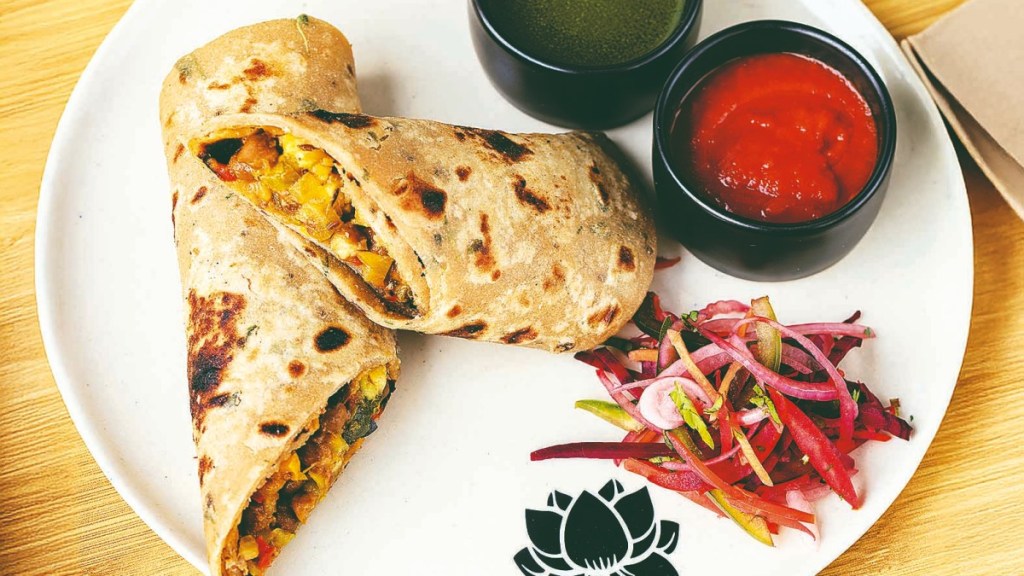Ayurveda healing has now moved from healing kitchens to cafés. A handful of restaurants and cafes are taking this age old wisdom to food lovers.
Launched in January this year, Cafe Swasthya in Gurugram combines tradition and urban convenience. Customers can scan a QR code on their tables to take a short quiz that identifies their dosha type: Vata, Pitta, or Kapha, and then choose foods suited to their constitution. The menu includes thalis, wraps, soups, and even pasta, but each dish is designed with ayurvedic compatibility in mind.
The café’s bakery offers cookies, cakes, and herbal teas rooted in ayurvedic formulations. Interiors made of mud walls, bamboo ceilings, and copper thalis complete the immersive experience. In three months, over 6,000 customers walked through its doors, prompting plans for a second outlet.
Cafe Swasthya is part of a wider movement. Across India, restaurants are weaving ayurveda into mainstream dining. Soma Ayurveda Kitchen, Aharveda in Andheri (Mumbai), Swadshakti (Mumbai), and Pathyam in Pune are among the new generation of eateries offering sattvic and dosha-balanced meals. At Swadshakti, co-founded by Dr Smita Naram and her late husband Dr Pankaj Naram, the mission was clear: provide patients undergoing ayurvedic treatments with supportive food.
“Our principle was food must heal, not harm. We don’t use wheat, tomatoes, or even milk in our halwa. Instead, we cook with ragi, coconut, makka, and rice flour. The food is light, nourishing, and satisfying,” says Naram.
Signature dishes like moong khichdi, energy kadhi, and panchkarma thali have become popular here. Initially designed to support panchakarma detox treatments, the meals are now delivered via Zomato to households across Mumbai, showing how ayurvedic food is entering everyday diets.
The idea that food is medicine is central to ayurveda. Stuti Ashok Gupta, co-founder of Amrutam, a D2C ayurvedic lifestyle brand, explains, “Food is the first pillar of health. It’s not just fuel but Ojas, the essence that sustains immunity, energy, and emotional balance. What matters is not only what we eat, but what we digest. When food aligns with our body type and nature’s rhythms, it restores harmony.”
Amrutam’s products like ayurvedic malts (Avaleh), slow-cooked blends of herbs, nuts, and spices, are making this wisdom practical for modern consumers. They are seen not just as “health products” but as daily rituals of care.
This year, the Food Safety and Standards Authority of India (FSSAI) also launched a dedicated licensing and registration window for ayurveda aahara on its Food Safety Compliance System (FoSCoS) portal. This has introduced for the first time for businesses to apply for official licenses to manufacture and market ayurvedic foods, bringing a once-fragmented sector under a regulatory umbrella.
The new ‘Kind of Business’ (KoB) category allows food manufacturers to use traditional formulations, documented in authoritative ayurvedic texts within modern food safety frameworks. To smoothen the transition, FSSAI has already published a list of 91 pre-approved recipes, ranging from herbal mixes to dosha-balancing preparations. The move, developed with the Ministry of Ayush, is designed to fuel innovation while maintaining authenticity, offering consumers trustworthy products and businesses a streamlined pathway into this growing market.
“This is about more than licensing, it is about aligning India’s deepest food traditions with contemporary lifestyles and safety standards,” says an FSSAI official.
Akshi Khandelwal, founder of Cafe Swasthya & Butterfly Ayurveda, an organisation engaged in the research, development, manufacturing, and marketing of ayurvedic products, says the new policy is more than welcome, it is validation. “Ayurveda isn’t some esoteric philosophy, it’s woven into how we cook dal, use spices, or balance meals at home. So why shouldn’t our café culture reflect that?,” she says.
The growing popularity of ayurveda food comes at a time when the government is pushing for broader recognition and relevance of ayurveda in healthcare — from Prime Minister Narendra Modi talking about sustainable food culture and linking ayurveda with ancestors, to celebrating Ayurveda Day as a future-ready system of medicine. Preetha Reddy, executive vice-chairperson of Apollo Hospitals, has highlighted ayurveda’s growing global appeal, saying, “The world is increasingly turning to India for its ayurveda wisdom. At Apollo, we see it as a critical partner in preventive and holistic care.”
The FSSAI’s structured framework will protect consumers from spurious claims while allowing genuine businesses to thrive. Entrepreneurs like Akshi Khandelwal are proving that ayurveda can be chic and modern, while pioneers like Dr Naram remind us that its power lies in its simplicity. If ayurveda aahara can balance authenticity with accessibility, it may redefine not just wellness dining, but India’s role in shaping a healthier global food culture.








